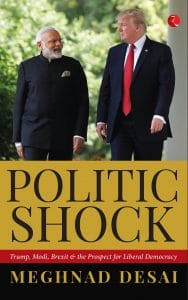Many of our current international political conflicts – Middle East, Islamic extremism, North Korea- arise from the problems left unresolved by the First World War.
In 1917, America entered the war and Russia had a Communist Revolution, followed by the decline of British and European hegemony. German, Austro-Hungarian and Russian Empires were destroyed.
The inter-war period was plagued by economic depression and the lack of a single hegemonic power. After the Second World War, the hegemony passed from Europe to USA and USSR –and the two superpowers positioned themselves at two ends of the spectrum in matters of both economic and political freedom. Fifty years of Cold War established the hegemony of liberal politics and free-market based capitalism.
Ironically, there is a populist assault on both these values – most visible in the very bastions where they flourished.
There is a threat to this liberal order today, led by the election of Donald Trump. In the Western media, the election of Trump in November 2016 was described as a catastrophe for the liberal order. The UK vote to exit the European Union in June 2016 had already provided a shock. Analysts asked if the twin shocks would herald the end of globalisation and liberal order and will be accompanied by the resurgence of nationalism and populism across the world.
Here I would like to examine my argument outside the Western context. The response of American and European media to Donald Trump was reminiscent of the way in which Indian media and the political world reacted to the rise of Narendra Modi in 2013-14. I see Trump and Modi as two outsiders who have disturbed the complacent tranquillity of establishment politics. Of course, they are different in many ways but each has upset the system they have defeated and the media in both countries is unanimous in rejecting them.
The roots of this shock and reaction go back to the last fifty years of electoral politics where ideology declined in importance and every party is encouraged to be part of a centrist consensus.
In the USA, the electoral choice is compared to one between Coke and Pepsi. In India, there is the notion that there can only be one “idea of India”. But in both the countries, nationalism has become the vital source of an alternative vision.
Even as it is argued that globalisation and free trade benefit all countries, history proves otherwise. Many of the economies now swearing by free trade were protectionist when they were developing. The economics of nationalism remains a vital force for development not just for a rising economy like India, but even for a mature economy like USA, which is anxious to retain its lead. Trump’s America First and Modi’s India First themes are as much about nationalism as about smart economic growth and challenges of generating jobs in a globalized world.
Even so, the alarm about the liberal order is too West-centric. Asia has evolved along a different path as can be seen in the rapid growth of Japan, Singapore, South Korea and China. They have become rich countries without adopting the liberal democratic political system in its Western form.
India remains an anomaly in Asia as it is the only successful liberal democracy. Its elite thinks along European lines and does not identify itself as an Asian country. On top of that, there is also a rivalry and potential for armed conflict between China and India. The recent calls for boycott of Chinese-made products by some sections in India showed how political and economic nationalism converged.
In the context of an uncertain economic future – with IT and robotics poised to radically shift the business-as-usual — will the battle for hegemony between USA and China involve India as well?

Politic Shock: Trump, Modi, Brexit & the Prospect for Liberal Democracy by Meghnad Desai has been published by Rupa Publications






